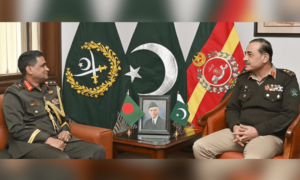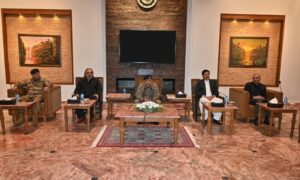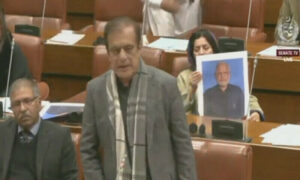ISLAMABAD: Justice Musarrat Hilali, a member of the Constitutional Bench hearing the case of military trial of civilians, has wondered whether the Pakistan Army Act (PAA) 1952 outlined any punishment for officers who suspend the Constitution.
Justice Hilali was part of the seven-judge bench hearing intra-court appeals (ICAs) against the Supreme Court’s October 2023 order of nullifying the military trial of civilians involved in the May 9 violence.
She also posed questions about Article 6 of the Constitution, which deals with high treason.
If the provision was applicable to every citizen, then how are certain fundamental rights, also enshrined in the Constitution, not applicable to the accused facing trials under the PAA, observed Justice Hilali.
Judges question whether evidence presented before military courts fulfils Qanoon-i-Shahadat requirements
In response to the queries, Khawaja Haris Ahmed, representing the Defence Ministry, contended that Article 6 prevails over all laws.
On this, Justice Jamal Khan Mandokhail wondered what punishment was outlined in Article 6 for aiding constitutional violations.
He remarked that even the judiciary has endorsed or validated the abrogation or suspension of the Constitution in the past.
Justice Muhammad Ali Mazhar recalled how during the treason trial of Gen Pervez Musharraf, the names of certain judges were taken, but they were never tried.
Legality of military trials
When Mr Haris laid out the PAA provisions that outline the process to set up courts for trying civilians, Justice Mandokhail remarked that there was no dispute over these courts.
The only point of concern was the extent to which the act could include civilians in its domain, he observed.
The counsel highlighted past Supreme Court decisions that empower the higher judiciary to review military court verdicts if legal requirements were not met.
Another bench member, Justice Syed Hasan Azhar Rizvi, remarked that without examining the military court’s judgments, how will the court know whether the requirements of Qanoon-i-Shahadat act have been adhered to or violated?
He also asked if the court could see the record of these cases.
“We want to see what was the standard of evidence recorded in the military trial, was the cross-examination of the witnesses was conducted, was the right to present defence witnesses were allowed, whether the right to be represented through a counsel of choice was given and whether the witness recorded was reflected in the judgment by the military court or not,” asked Justice Rizvi.
The counsel agreed to put case records before the court and the procedure followed in the trial without revealing the convict’s identity.
The apex court should not ad-dress the merits of the cases and the trials should not be affected by the proceedings of this case, the counsel said.
Justice Aminud Din Khan, who is heading the bench, asked the counsel to keep the record safe.
The court will ask for it if need be since there will be appeals against the trials.
Justice Mazhar said it was necessary to see the record to ascertain whether a fair trial was ensured and requirements of the Criminal Procedure Code were fulfilled.
He added that it was also necessary to determine whether a joint trial of all accused took place to ensure that the prohibition of double jeopardy in the trial was ensured.
The prohibition of double jeopardy is a legal principle that prevents an accused from being tried or charged again for the same crime if they have already been tried and found not guilty.
The counsel, Mr Haris, stated that the trials were conducted separately and argued that the Supreme Court “cannot see” the quality of evidence in military trials.
The counsel said before reviewing the quality of evidence, the Supreme Court has to consider the jurisdiction of the present appeals.
Justice Rizvi said the court will not discuss the cases but can examine the record.
When Justice Mandokhail observed that he was confused as to how an ordinary citizen was connected to the discipline of the armed forces, the counsel replied that if the citizen was accused of seducing an army officer, the provision of law dealing with maintaining discipline in the armed forces apply to them.
Published in Dawn, January 14th, 2025







